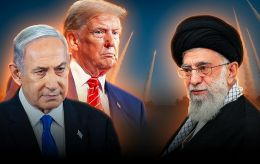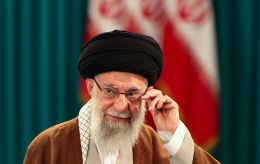'White flag' of the Pope: Francis' controversial statements on Ukraine's war and his ambiguous stance
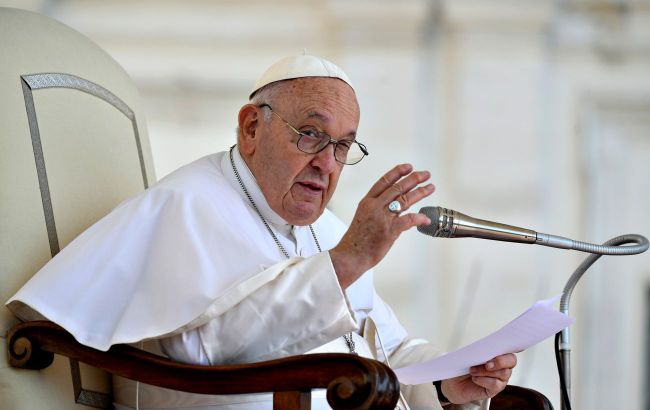 Pope Francis once again made a statement about negotiations between Ukraine and Russia (Photo: Getty Images)
Pope Francis once again made a statement about negotiations between Ukraine and Russia (Photo: Getty Images)
Pope Francis's latest statement on the war has stirred outrage in Ukraine and Western countries. This time, he urged to find the courage to start negotiations with the Russian Federation and even used the phrase "white flag." Learn more about his position on the war, the scandalous words, and whether this indicates a trend towards our country's inclination for negotiations in the material by RBС-Ukraine.
The preparation of the material involved: Francis's interview for the Swiss TV channel RSI, other statements on the war, Vatican clarifications, material by BBC Ukraine, Reuters, The Atlantic, the Belgian magazine Knack, President Volodymyr Zelenskyy's reaction, Foreign Minister Dmytro Kuleba, and Western partners, as well as political analyst Volodymyr Fesenko's commentary.
Content
- What did Francis say, who is he, and how was his worldview formed?
- Pope Francis's statements on the war and what lies behind his position
- Ukraine's relations with the Vatican and how Francis undermines his authority
- Interpretation issues? What Francis really meant
- Line-up of peacekeepers: Who and why is pushing Ukraine towards negotiations with Russia
What did Francis say, who is he, and how was his worldview formed
Pope Francis's scandalous statement made during an interview with the RSI television and radio company in February has sparked outrage in Ukraine and Western countries. The transcript and video excerpts were obtained by Reuters, which subsequently disseminated the words of the Pope. The full interview is set to be released on March 20.
"But I think that the strongest one is the one who looks at the situation, thinks about the people and has the courage of the white flag, and negotiates...The word negotiate is a courageous word. When you see that you are defeated, that things are not going well, you have to have the courage to negotiate...Do not be ashamed of negotiating, before things get worse...Negotiating is never a surrender," he said, adding that Ukrainians have suffered since Stalin's time and Türkiye could act as a mediator.
This is far from the first statement by the Pope that has been sharply criticized in Ukraine. Much of his position should be considered, including through the prism of how his worldview was formed.
Jorge Mario Bergoglio (Francis's name in secular life) was born in 1936 in Buenos Aires, Argentina, to a family of Italian immigrants. After completing high school with a specialization in chemistry, he worked in the Hickethier-Bachmann laboratory, where he was involved in food quality control. At the age of 21, he entered the seminary, later joining the Jesuit order, completing several educational institutions. From 1964 to 1966, he taught literature and psychology, and from 1967 to 1970, he obtained a licentiate in philosophy from the Faculty of Theology at the Higher College of St. Joseph.
He was ordained a priest in 1969. In the 1970s and 1980s, he held various spiritual positions in Argentina and Spain, and in 1992, he was appointed auxiliary bishop of Buenos Aires. He became a cardinal in 2001, participated in the Conclave in 2005, where he was the main competitor of Joseph Ratzinger, who subsequently became Pope Benedict XVI. From 2005 to 2011, he chaired the bishops' conference of Argentina. He was elected the 266th Pope in March 2013.
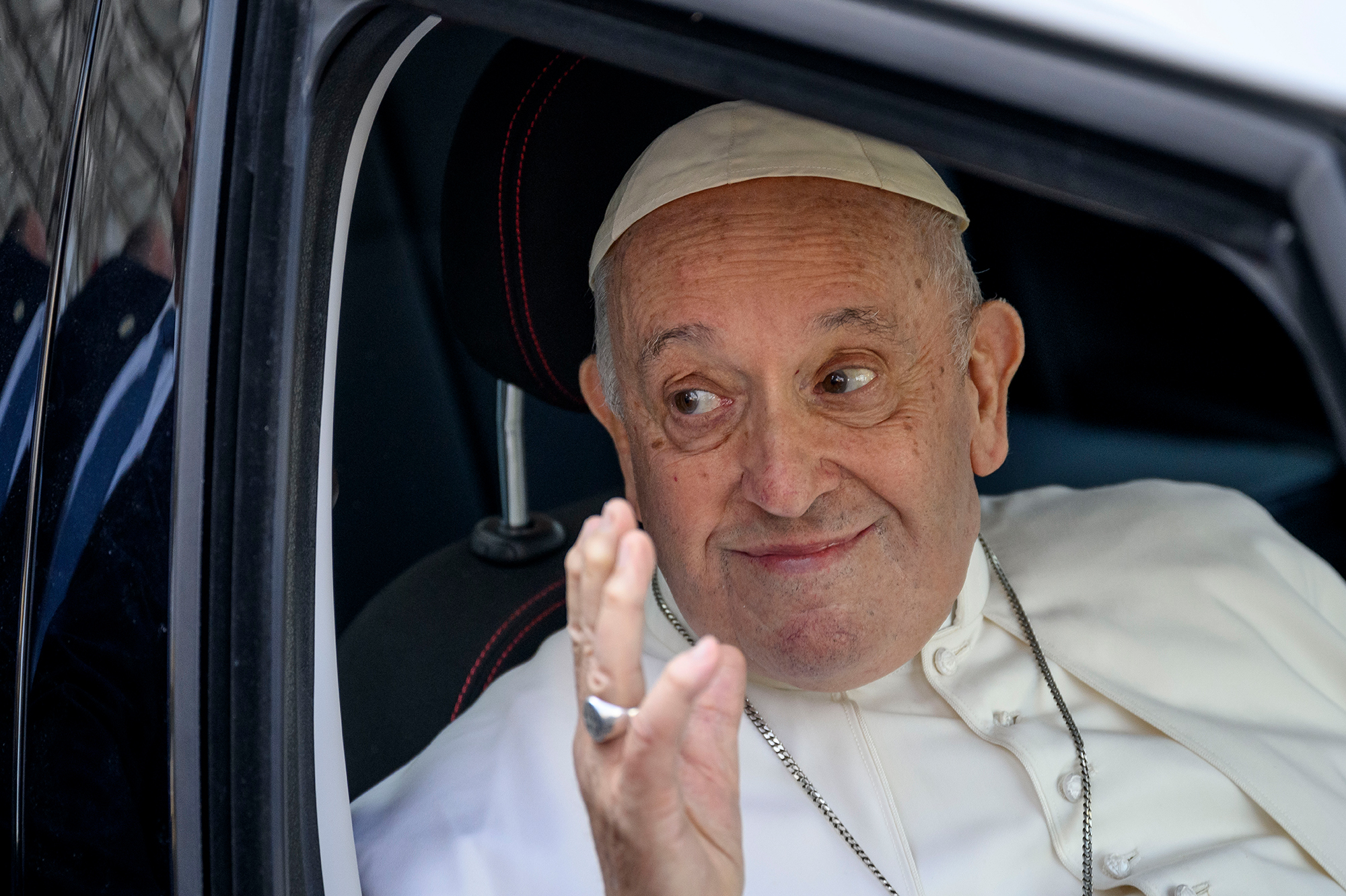 Francis has a bias against the USA and NATO (Photo Getty Images)
Francis has a bias against the USA and NATO (Photo Getty Images)
Pope Francis is considered to have been heavily influenced by Peronism. This is a populist trend that combines Argentine nationalism, authoritarianism, self-reliance (autarky), syndicalism, and Christian socialism to varying degrees. Syndicalism is an economic system concept that hypothetically replaces capitalism, envisioning workers, industrial enterprises, and organizations uniting in confederations or syndicates. Christian socialism is a direction of social thought that seeks to combine a socialist economic model with traditional Christian ethics.
His conviction was also influenced by the so-called liberation theology, which emphasizes the role of the Church in defending the poor, a concept that has been popular in Latin America for decades. The concept has a left-wing political character, including certain anti-American sentiments and biases against NATO, which Francis may have absorbed to some extent.
He also embodies the peacemaking tradition of the Vatican, established during the First World War, as reported by BBC Ukraine. At that time, Pope Benedict XV sought to reconcile warring parties. Additionally, the history of that war has a personal dimension for Francis. His grandfather was a liaison officer in the Italian army and, speaking about trench warfare, said that "soldiers did not want to fight, but politicians fed people."
Pope Francis's statements on the war and what lies behind his position
For the first time, Francis publicly condemned Russia for its war against Ukraine in January 2024. Then, in his address to members of the diplomatic corps accredited to the Holy See, he listed the events afflicting humanity and highlighted the large-scale war waged by Russia against Ukraine. Before this, he had avoided direct accusations against Moscow.
In particular, in 2019, during a meeting with leaders of the Ukrainian Greek Catholic Church, he referred to the situation as complex and described the war in the east as "hybrid." However, he did not directly mention Russia, although he had previously met with Vladimir Putin.
"In the name of God, I ask you: stop this massacre," he appealed after the full-scale invasion in 2022.
Among other things, he called the killing of civilians "having no strategic reasons," and Mariupol a "martyred city." He also emphasized that he does not see the war in Ukraine as a struggle of good against evil. In his opinion, the invasion could have been provoked.
"What motives pushed Russia to embark on such a brutal conflict? I assume NATO barking right at Russia's door," said Francis.
In August, he commented on the killing of Daria Dugina, the daughter of one of the ideologues of the "Russian world," Alexander Dugin, saying what he thought of the "poor girl" who died in a mined car, and added that "the innocent pay for the war." At that time, Ukrainian Foreign Minister Dmytro Kuleba expressed disappointment, emphasizing that "the Ukrainian heart is torn by the pope’s words."
In the Vatican's explanation, they outlined the official position.
"In this regard, it is reiterated that the Holy Father's words on this dramatic issue should be interpreted as a voice raised in defence of human life and the values associated with it, and not as a political stance. As for the large-scale war in Ukraine, initiated by the Russian Federation, the Holy Father Francis' interventions are clear and unequivocal in condemning it as morally unjust, unacceptable, barbaric, senseless, repugnant and sacrilegious," they said.
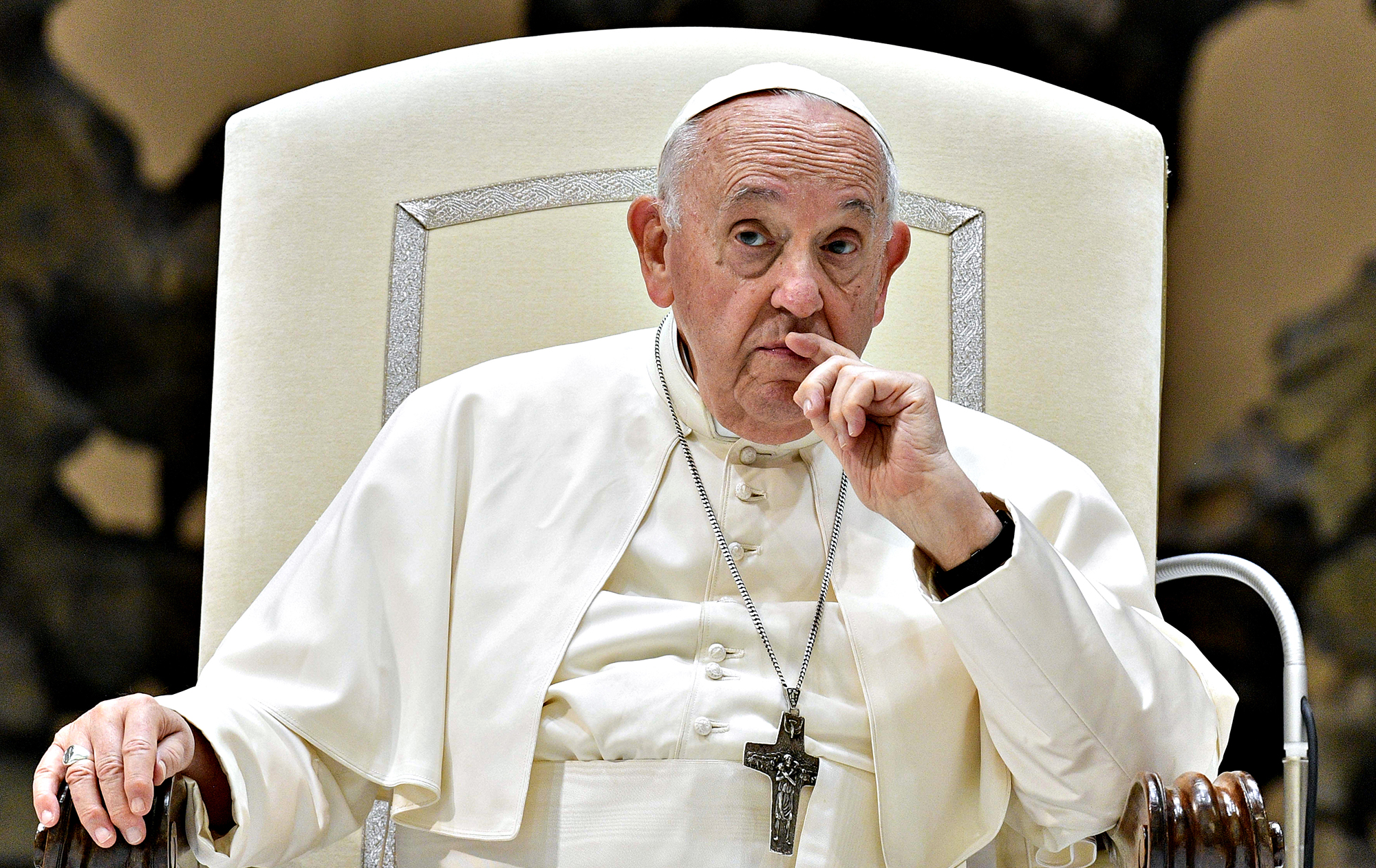
In 2022, Francis said that the invasion could have been provoked by "the NATO barking at Russia's door" (Photo: Getty Images)
In March 2023, he spoke of his willingness to come to Kyiv, but only on the condition that he travel to Moscow on the way. The Ukrainian side has repeatedly invited him, but the visit has not yet taken place. In May, the pontiff met with President Volodymyr Zelenskyy and also met with the wives of captured Azov fighters.
At the Easter Mass, Francis asked God to "pour out the Easter light on the Russian people" and added: "May the Lord be with them (Russia and Ukraine - Ed.) and help them reconcile." At an online meeting with Catholic youth from St. Petersburg, he called them "heirs of Great Russia" and urged them to "never give up this legacy." In response to criticism, he acknowledged that he had poorly chosen words and did not intend to justify Russian imperialism.
The West and Ukraine have many reasons to be dissatisfied with Francis's statements. His words sharply differ from the traditional philosophy of the Vatican but are not arbitrary. This is a response to the changing Catholic Church. Today, most Catholics live outside Western countries, and they do not perceive war as Europe and the USA do, wrote the authoritative magazine The Atlantic.
Historically, the Holy See practiced the model of diplomacy of a "great power," aligning itself with the superpower of its time. De facto, for centuries, this meant alliances with the Holy Roman Empire, the French monarchy, and the Austro-Hungarian Empire. For much of the 20th century, the Vatican was so tied to Western countries that Pope Pius XII (a staunch anti-communist) was dubbed the "chaplain of NATO." John Paul II was considered not only an important spiritual but also a political figure standing at the forefront of the Cold War.
Francis embraced what could be called the Vatican's first geopolitical multipolar strategy. Instead of following Western consensus, he seeks unconventional allies. And the main reason is demographic: by 2000, there were 1.1 billion Catholics in the world, but only a third of them lived in Europe and North America. The vast majority - 720 million - already lived in Latin America, Africa, and Asia. And by 2025, it is expected that only one in five Catholics will be non-Spanish-speaking Europeans.
Thus, today's Pope should be understood not in terms of the West versus the East but the North versus the South. On the Global South, the Russo-Ukrainian war is largely seen as a European affair, and his words coincide with the sentiments of the majority of Catholics who do not live in NATO countries, as noted in The Atlantic.
Ukraine's relations with the Vatican and how Francis undermines his authority
Although the majority of Ukrainians adhere to Orthodoxy, the Catholic Church in Ukraine holds significant sway. In 2020, the number of Catholics in the country was estimated at around 6.5 million, with about 5 million belonging to the Ukrainian Greek Catholic Church, which follows the Byzantine rite but recognizes the Pope as its head. Consequently, for many in Ukraine, his authority is undisputed.
In spring 2023, Francis announced that the Vatican was participating in peace efforts to end the war. President Volodymyr Zelenskyy stated that Ukraine needed his assistance in humanitarian matters, such as the return of deported children and the exchange of prisoners. However, Western media reported that Ukrainian and Russian leaders had supposedly given the green light for steps towards the peace process.
In May, it became known that the Pope had appointed Matteo Zuppi as his envoy to search for "paths to peace." In June, he met with Zelenskyy and prayed at a church in Bucha. Immediately after the failed Wagner Group coup attempt, he visited Moscow, where he met with Patriarch Kirill and Putin's chief adviser Yuri Ushakov. In July, he visited the White House, but as of yet, there has been no concrete peace plan from the Vatican.
"Matteo Zuppi's mission is mainly mediation. As long as the warring parties do not want mediation, it makes no sense," said Jan de Volder, a professor of religious history at the University of Leuven (Belgium).
 The papal envoy Matteo Zuppi is tasked with seeking "paths to peace" (Photo: president.gov.ua)
The papal envoy Matteo Zuppi is tasked with seeking "paths to peace" (Photo: president.gov.ua)
Despite Francis's seemingly pro-Russian comments, he remains an interesting partner for Ukraine in a potential peace process. At least this is evidenced by the reaction to the white flag statement. It should be noted that the white flag is a sign of a ceasefire or negotiation proposal used in prisoner exchanges and also symbolizes surrender. The Ukrainian side mainly interprets it in the latter sense.
Foreign Minister Dmytro Kuleba stated, "Our flag is a yellow and blue one. This is the flag by which we live, die, and prevail." And Zelenskyy directly criticized the Vatican's mediation efforts.
"And I am grateful to each chaplain who is with the army, in our defense forces, on the frontlines, protecting life and humanity. Those who support others through prayer, conversation, and actions. This is what the Church is: one with the people. Not two and a half thousand kilometers away—somewhere, looking for a virtual meditation between those who want to live and those who want to destroy you," he said.
In a joint statement by the Ukrainian clergy, it is stated that surrender is impossible because it means the death of the Ukrainian people. Western partners also opposed the white flag. As Latvian President Egils Levits hinted at Russia, the white flag of surrender "should raise evil." Japanese government representative Yoshimasa Hayashi urged respect for Ukraine's will, and NATO Secretary-General Jens Stoltenberg emphasized that surrender is not peace.
Political scientist Volodymyr Fesenko says that Ukraine could not ignore the words of the leader of the world's largest religious community. But more importantly, representatives of countries with Catholic populations sharply criticized Francis's statements.
"The position of various leaders of influential countries is important to us. But this does not mean that we will take into account, that their position will affect our position. As for Francis, he has repeatedly made statements that have been criticized. This will not affect public opinion in Ukraine, nor the prospects for the peace process. But unfortunately, it will affect the authority of the Pope. He undermines his authority and the authority of the Vatican. He not only does not contribute to the Vatican's claims to the role of peacemaker, but, on the contrary, the chances become slimmer," he says in a comment to RBC-Ukraine.
Interpretation issues? What Francis really meant
To be fair, it should be clarified that the 87-year-old pontiff used the phrase "white flag" at the prompting of RSI journalist Lorenzo Buccella. It was Buccella who used these words, trying to clarify Francis's position on the debates between those who have "the courage of the white flag" and those who believe that this legitimizes the aggressor's actions. Based on the response, Reuters concluded that the Pope used the phrases "white flag" and "defeated" in the context of this war for the first time.
Francis's call had to be explained by the Vatican press office. Its director, Matteo Bruni, stated that the phrase "white flag" was misunderstood.
"The Pope uses the term white flag and responds by picking up the image proposed by the interviewer, to indicate a cessation of hostilities, a truce reached with the courage of negotiation. Elsewhere in the interview, speaking of another situation of conflict, but referring to every situation of war, the Pope clearly stated: 'Negotiations are never a surrender'," he emphasized.
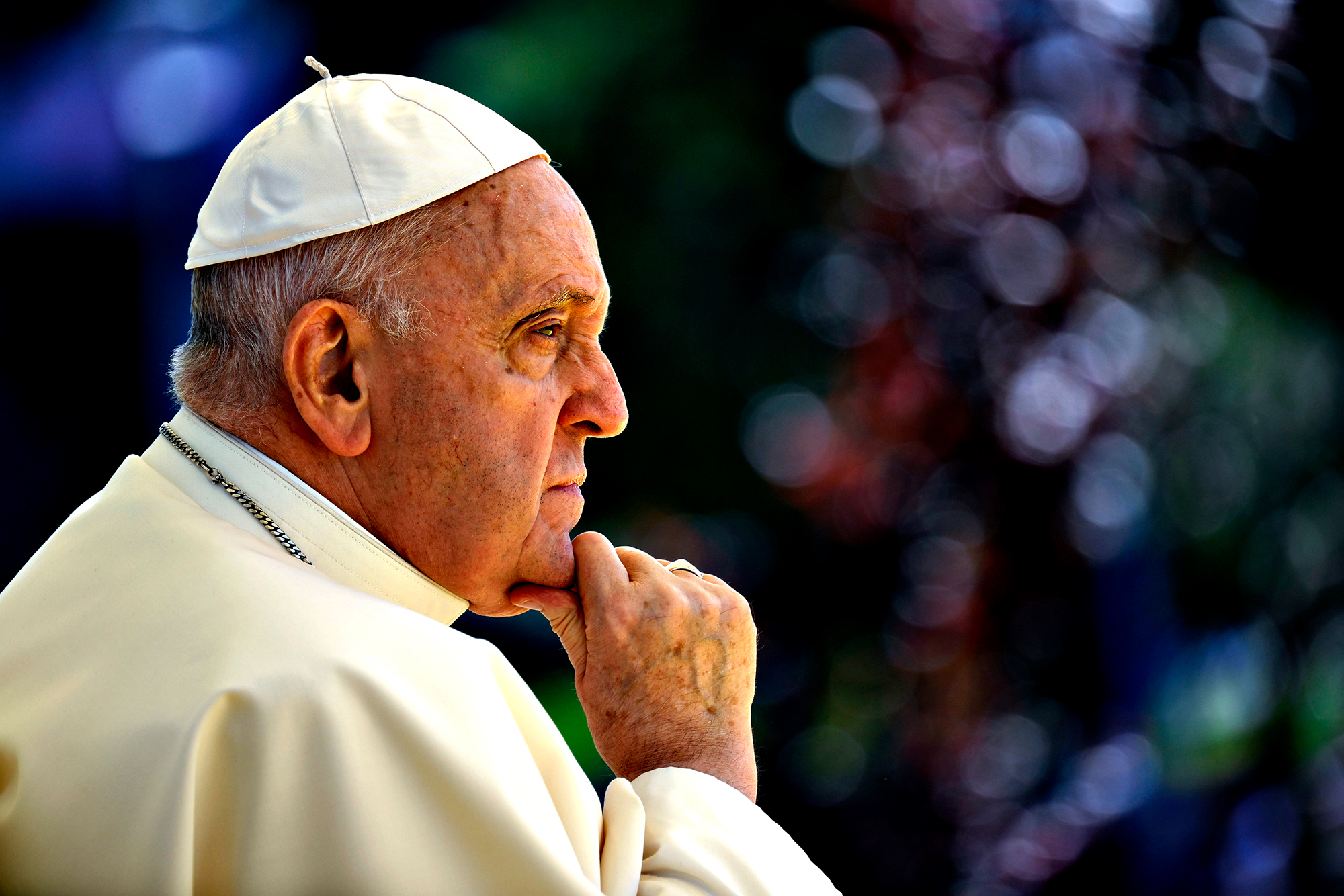 The Vatican press office often takes the rap for Francis (Photo: Getty Images)
The Vatican press office often takes the rap for Francis (Photo: Getty Images)
According to him, Francis once again confirmed, using the image of the white flag, what he has repeatedly stated: the importance of dialogue against the "madness" of war and the priority of caring for the fate of the peaceful population. He also reminded that on the second anniversary of the full-scale war, the Pope expressed his commitment to the long-suffering Ukrainian people and prayed for humanity that would create conditions for a diplomatic solution in the search for a just peace.
Given that Vatican representatives constantly have to defend Francis, it is unlikely that it would be appropriate to speak about translation or interpretation difficulties.
"He is not the first to make, to put it mildly, ambiguous statements. It seems to me that he has lost touch with political reality. He lives in some kind of parallel world. And it's not just about his war with Russia against Ukraine. But what he's doing is not the first time, causing criticism even in Catholic countries, actually harming the authority of the church hierarchy," Fesenko believes.
Line-up of peacekeepers: Who and why is pushing Ukraine towards negotiations with Russia
It's worth noting that Francis's remarks, which caused a stir, came during a period of Ukraine's retreat on the front lines and a new wave of discussions about the possibility of negotiations with Russia. Last week, China's special representative Li Hui visited Kyiv, but it seems his second attempt to restart the peace process was no more successful than the first.
More on this in the article "China's neutrality in Russia-Ukraine war: Beijing's diplomatic gambit and its motives."
On Friday, Volodymyr Zelenskyy was in Istanbul, where his colleague Recep Tayyip Erdogan said that Türkiye was ready to host a peace summit, but with the caveat that Russia would be invited. The Ukrainian president responded by saying he did not see Russian representatives at such a summit, as a plan for a just peace must be developed beforehand, and only then should Russians be involved, "those who want a fair peace."
Recently, Hungarian Prime Minister Viktor Orban met with Donald Trump, the sole candidate from the Republican Party in the US presidential race. Who claimed that he could allegedly end the war in 24 hours. After the meeting, Orban shed light on Trump's peace plan. According to him, if elected, Trump "won't give a penny" to Ukraine.
"If the Americans don’t give money and weapons, along with the Europeans, the war is over. And if the Americans don’t give money, the Europeans alone can’t finance this war. And then the war is over," explained the logic of Trump, indicating that it's not about ending the war, but about Ukraine's defeat.
Elon Musk, one of the world's richest individuals, is playing into the hands of opponents of aid to Ukraine. According to him, our country has allegedly "lost the war," and American assistance won't change the situation, and the question is only "how many die before the reality is accepted."
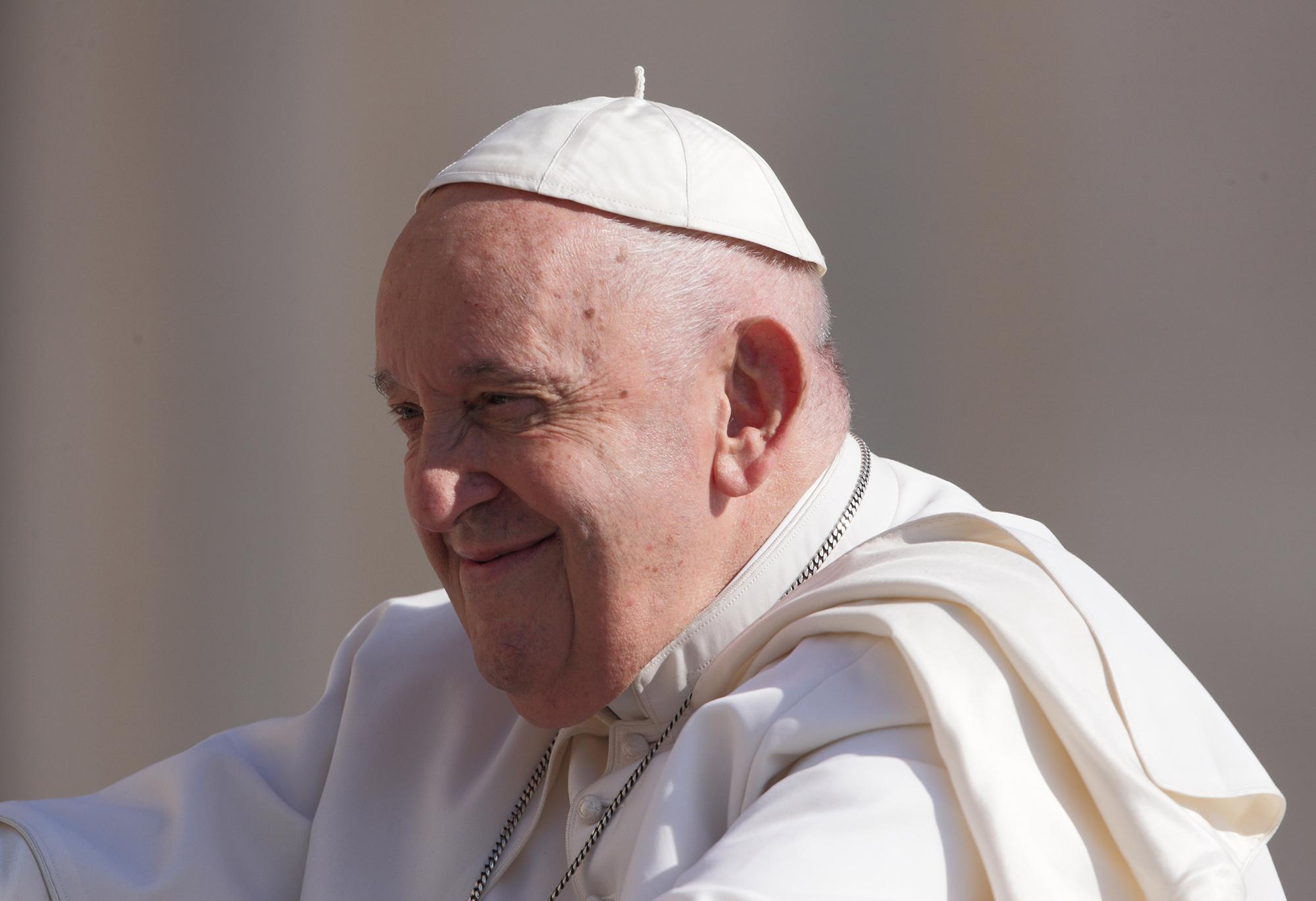 The peacekeeping statements of the Pope of Rome resonate against the backdrop of similar messages from Türkiye and China (Photo: Getty Images)
The peacekeeping statements of the Pope of Rome resonate against the backdrop of similar messages from Türkiye and China (Photo: Getty Images)
It's no wonder that Francis's statement worried Ukrainians. Especially considering that the Kremlin reacted positively to his words. Dmitry Peskov, a spokesperson, noted that Putin supposedly constantly talks about readiness to solve problems through negotiations. According to him, overall, the pontiff's statements had a broader context, and Ukraine was supposedly "deeply mistaken" in its attempt to use Western assistance to defeat Russia strategically.
According to Volodymyr Fesenko, the statements of different speakers are not related to each other and have different logic. For example, regarding Trump, one should focus on his position, and not on how it was presented by Orban. In February, Trump advocated for providing Ukraine with money as a loan. And, as is known, the spokesman for the US House of Representatives, Mike Johnson, is preparing the relevant bill.
At the same time, Li's visit and Erdogan's words fit into a single logic. And they were prompted by the intensification of efforts by Ukrainian diplomacy.
"Why did this happen now? Ukrainian diplomacy is preparing for the Global Peace Summit, and it was the preparation for it that prompted such statements. China has become more active because some countries of the Global South are asking whether it will participate. Therefore, there was a new round of visits by Li Hui to assess the situation and decide. Zelenskyy's visits to Saudi Arabia and Türkiye are related to the fact that he is negotiating with influential leaders about their personal participation and influence on other countries of the Global South," he tells RBC-Ukraine.
In his opinion, such a wave of "peace initiatives" does not mean that Ukraine will be inclined to negotiate peace on Russia's terms.
"Our partners, primarily the US, at least the current administration, and Europe, see perfectly well that now is not the time to start negotiations. Because in the current wartime situation, Russia will only conduct them on its terms. And peace on Russian terms is unacceptable to us and largely unsatisfactory for the West. If we start negotiations now, it is impractical, and the West manifested this, in particular, in the criticism of Francis's statements. The same thought is expressed: first, we must help Ukraine, and then, by stopping the Russian army, negotiate peace. Therefore, it is not a question of us being collectively inclined. There is no such thing. Except for China and Türkiye, which claim the role of mediator," Fesenko adds.
Tonight, the Ukrainian Foreign Ministry expressed disappointment to the Apostolic Nuncio Visvaldas Kulbokas over the pontiff's words about the "white flag" and the need to show courage and negotiate with the aggressor. Also, they pointed out that they are waiting for signals from Francis about uniting forces to ensure victory of good over evil, and an appeal to the aggressor, not the victim.
As for peaceful initiatives, peace must be just, based on the principles of the UN Charter and the Ukrainian formula with 10 points, the Foreign Ministry added.
